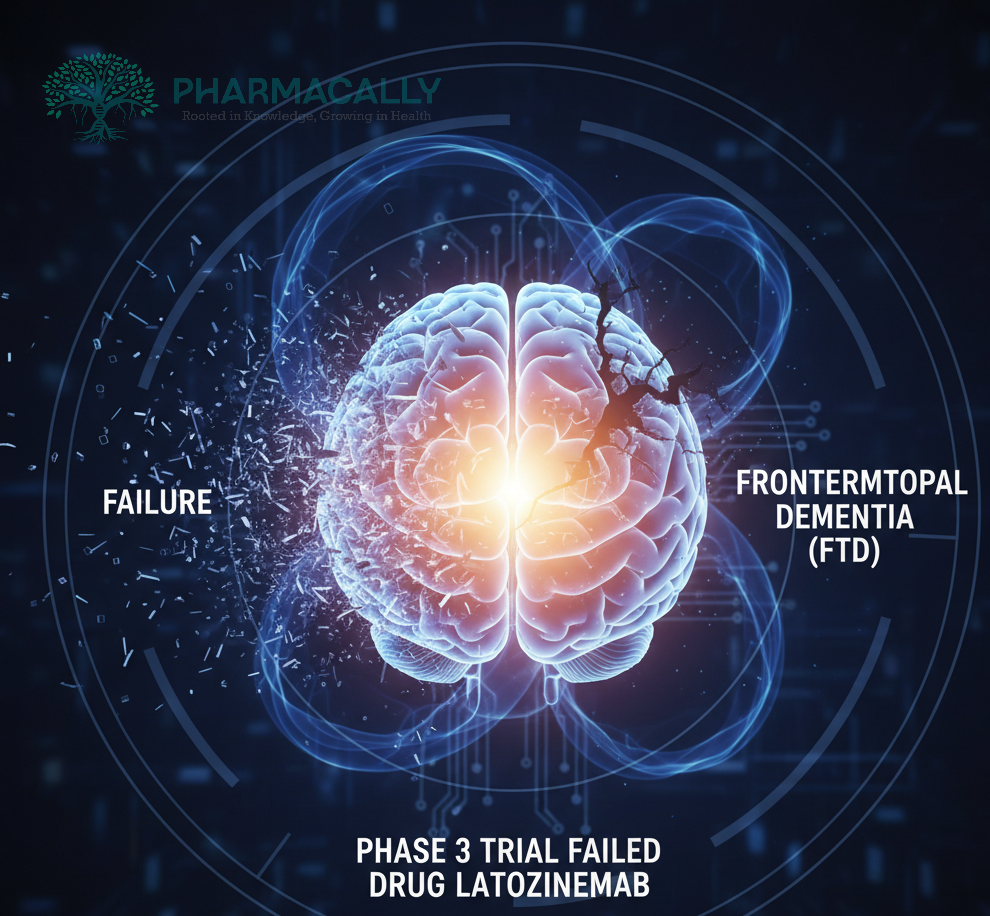Written By: Abhinay Wadekar, BPharm
Reviewed By: Pharmacally Editorial Team
Alector Inc., a South San Francisco-based biotechnology company pioneering immuno-neurology treatments, announced that its investigational antibody latozinemab (AL001) failed to meet its primary clinical endpoint in the pivotal INFRONT-3 Phase 3 trial. Developed in partnership with GSK, the drug was being studied for frontotemporal dementia (FTD) caused by mutations in the GRN (progranulin) gene a devastating form of inherited neurodegeneration that accounts for roughly 20% of genetic FTD cases.
About the Investigational Drug
Latozinemab (AL001) is a monoclonal antibody designed to inhibit the sortilin receptor, a cellular receptor that normally mediates the degradation of progranulin (PGRN), a neuroprotective protein. By blocking this receptor, Latozinemab aims to raise circulating levels of PGRN, potentially restoring neuronal health and reducing neuroinflammation. Preclinical and early clinical data had shown promising biomarker results, positioning latozinemab as a first-in-class therapeutic for FTD-GRN, a neurodegenerative disorder triggered by insufficient progranulin levels.
Detailed Trial Information
The INFRONT-3 study (NCT04374136) was a 96-week, international, randomized, double-blind, placebo-controlled Phase 3 trial evaluating the safety and efficacy of latozinemab in 119 enrolled participants with genetically confirmed GRN mutations. Its co-primary clinical endpoints included change from baseline in the Clinical Dementia Rating plus National Alzheimer’s Coordinating Center Frontotemporal Lobar Degeneration-Sum of Boxes (CDR plus NACC FTLD-SB) score, assessing disease progression. Its biomarker endpoint includes change in plasma progranulin concentration. Secondary and exploratory endpoints included volumetric MRI, fluid biomarkers, and other cognitive or functional assessment tools to evaluate neurodegenerative changes.
The topline results revealed that latozinemab did not meet the clinical co-primary endpoint, showing no significant difference versus placebo in slowing disease progression on the CDR plus NACC FTLD-SB scale.
However, the drug did achieve its biomarker co-primary endpoint, significantly increasing plasma progranulin concentrations confirming target engagement. Despite this biological success, there was no measurable impact on disease course or secondary measures such as volumetric MRI and fluid biomarkers.
What Went Wrong
Experts suggest that while latozinemab effectively boosted progranulin levels, increasing PGRN alone may not be sufficient to reverse or halt neurodegeneration once neuronal loss has progressed. This disconnect underscores a potential biological gap between biomarker correction and clinical benefit in FTD-GRN therapy. Analysts also noted that disease heterogeneity, trial duration, and stage of symptom onset may have contributed to the lack of observed efficacy.
Safety Profile
Across the 96-week treatment period, latozinemab was reported to be generally well-tolerated, with no major safety concerns or elevated adverse events compared with placebo. The company confirmed that the antibody exhibited a favorable safety signal consistent with earlier trials.
Key Opinions
Dr. Giacomo Salvadore, Alector’s Chief Medical Officer, stated that while latozinemab did not achieve clinical efficacy, the trial provided invaluable insights for understanding progranulin biology in neurodegeneration.
Meanwhile, Susan L-J Dickinson, CEO of the Association for Frontotemporal Degeneration (AFTD), emphasized that despite the disappointment, the study marked an essential milestone as the first completed large-scale Phase 3 trial in FTD-GRN, enriching future drug development paths.
Setback to Patients and Families
For families affected by FTD-GRN, the news represents a significant emotional and scientific setback. Many had placed hopes in latozinemab as the first disease-modifying therapy tailored for this aggressive form of dementia. Nevertheless, advocacy organizations reiterated that each clinical trial deepens collective understanding of the disease and propels the search for effective treatments forward.
Future Direction
Following the clinical failure, Alector terminated the open-label extension and continuation studies of latozinemab. The biotech also announced a 49% workforce reduction and organizational restructuring to conserve resources, maintaining an estimated $291 million cash runway through 2027. Future efforts will instead focus on next-generation immuno-neurology programs, including AL137 and AL050, slated for IND submissions in 2026 and 2027 respectively.
About Frontotemporal Dementia (GRN Mutation)
Frontotemporal dementia (FTD) encompasses a spectrum of disorders characterized by progressive degeneration of the frontal and temporal lobes, leading to behavioral and language difficulties. In GRN-related FTD, mutations in the progranulin (GRN) gene reduce the production of PGRN, a protein that maintains lysosomal function and neuronal survival. The deficiency promotes toxic protein buildup, inflammation, and neuronal death causing early-onset dementia typically between ages 40–65.
Understanding this pathway remains central to ongoing efforts in genetic and immuno-neurology drug development aimed at halting or delaying disease progression.
References
Alector Announces Topline Results from Latozinemab Phase 3 Trial in Individuals with Frontotemporal Dementia Due to a GRN Mutation and Provides Business Update, 21 Oct 2025, Alector, https://investors.alector.com/news-releases/news-release-details/alector-announces-topline-results-latozinemab-phase-3-trial
Alector Announces Topline Results from Latozinemab Phase 3 Trial in Individuals with Frontotemporal Dementia Due to a GRN Mutation and Provides Business Update, 21 Oct 2025, Globe newswire, https://www.globenewswire.com/news-release/2025/10/21/3170630/0/en/Alector-Announces-Topline-Results-from-Latozinemab-Phase-3-Trial-in-Individuals-with-Frontotemporal-Dementia-Due-to-a-GRN-Mutation-and-Provides-Business-Update.html
Alector Therapeutics Announces Results from Their Phase 3 Clinical Trial Evaluating Latozinemab, 21 Oct 2025, AFTD, Association of Frontotemporal Degeneration, https://www.theaftd.org/posts/front-page/alector-therapeutics-announced-results-from-their-phase-3-clinical-trial-evaluating-latozinemab/

